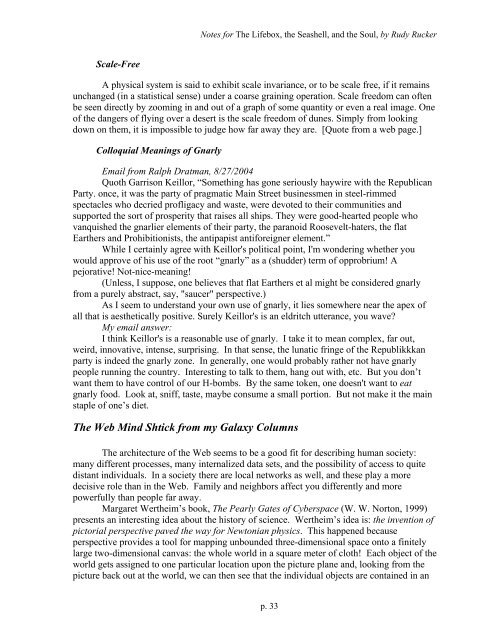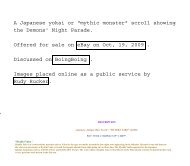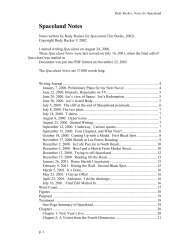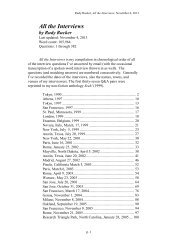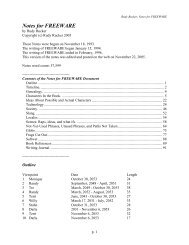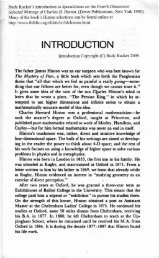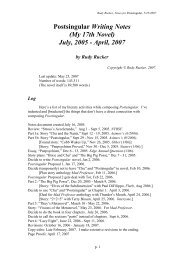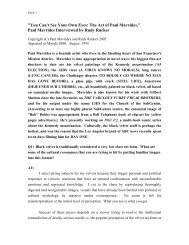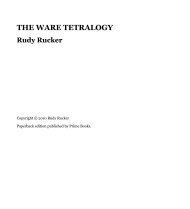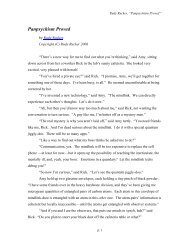Notes for the Lifebox, the Seashell, and the Soul - Rudy Rucker
Notes for the Lifebox, the Seashell, and the Soul - Rudy Rucker
Notes for the Lifebox, the Seashell, and the Soul - Rudy Rucker
Create successful ePaper yourself
Turn your PDF publications into a flip-book with our unique Google optimized e-Paper software.
<strong>Notes</strong> <strong>for</strong> The <strong>Lifebox</strong>, <strong>the</strong> <strong>Seashell</strong>, <strong>and</strong> <strong>the</strong> <strong>Soul</strong>, by <strong>Rudy</strong> <strong>Rucker</strong><br />
Scale-Free<br />
A physical system is said to exhibit scale invariance, or to be scale free, if it remains<br />
unchanged (in a statistical sense) under a coarse graining operation. Scale freedom can often<br />
be seen directly by zooming in <strong>and</strong> out of a graph of some quantity or even a real image. One<br />
of <strong>the</strong> dangers of flying over a desert is <strong>the</strong> scale freedom of dunes. Simply from looking<br />
down on <strong>the</strong>m, it is impossible to judge how far away <strong>the</strong>y are. [Quote from a web page.]<br />
Colloquial Meanings of Gnarly<br />
Email from Ralph Dratman, 8/27/2004<br />
Quoth Garrison Keillor, “Something has gone seriously haywire with <strong>the</strong> Republican<br />
Party. once, it was <strong>the</strong> party of pragmatic Main Street businessmen in steel-rimmed<br />
spectacles who decried profligacy <strong>and</strong> waste, were devoted to <strong>the</strong>ir communities <strong>and</strong><br />
supported <strong>the</strong> sort of prosperity that raises all ships. They were good-hearted people who<br />
vanquished <strong>the</strong> gnarlier elements of <strong>the</strong>ir party, <strong>the</strong> paranoid Roosevelt-haters, <strong>the</strong> flat<br />
Ear<strong>the</strong>rs <strong>and</strong> Prohibitionists, <strong>the</strong> antipapist anti<strong>for</strong>eigner element.”<br />
While I certainly agree with Keillor's political point, I'm wondering whe<strong>the</strong>r you<br />
would approve of his use of <strong>the</strong> root “gnarly” as a (shudder) term of opprobrium! A<br />
pejorative! Not-nice-meaning!<br />
(Unless, I suppose, one believes that flat Ear<strong>the</strong>rs et al might be considered gnarly<br />
from a purely abstract, say, "saucer" perspective.)<br />
As I seem to underst<strong>and</strong> your own use of gnarly, it lies somewhere near <strong>the</strong> apex of<br />
all that is aes<strong>the</strong>tically positive. Surely Keillor's is an eldritch utterance, you wave?<br />
My email answer:<br />
I think Keillor's is a reasonable use of gnarly. I take it to mean complex, far out,<br />
weird, innovative, intense, surprising. In that sense, <strong>the</strong> lunatic fringe of <strong>the</strong> Republikkkan<br />
party is indeed <strong>the</strong> gnarly zone. In generally, one would probably ra<strong>the</strong>r not have gnarly<br />
people running <strong>the</strong> country. Interesting to talk to <strong>the</strong>m, hang out with, etc. But you don’t<br />
want <strong>the</strong>m to have control of our H-bombs. By <strong>the</strong> same token, one doesn't want to eat<br />
gnarly food. Look at, sniff, taste, maybe consume a small portion. But not make it <strong>the</strong> main<br />
staple of one’s diet.<br />
The Web Mind Shtick from my Galaxy Columns<br />
The architecture of <strong>the</strong> Web seems to be a good fit <strong>for</strong> describing human society:<br />
many different processes, many internalized data sets, <strong>and</strong> <strong>the</strong> possibility of access to quite<br />
distant individuals. In a society <strong>the</strong>re are local networks as well, <strong>and</strong> <strong>the</strong>se play a more<br />
decisive role than in <strong>the</strong> Web. Family <strong>and</strong> neighbors affect you differently <strong>and</strong> more<br />
powerfully than people far away.<br />
Margaret Wer<strong>the</strong>im’s book, The Pearly Gates of Cyberspace (W. W. Norton, 1999)<br />
presents an interesting idea about <strong>the</strong> history of science. Wer<strong>the</strong>im’s idea is: <strong>the</strong> invention of<br />
pictorial perspective paved <strong>the</strong> way <strong>for</strong> Newtonian physics. This happened because<br />
perspective provides a tool <strong>for</strong> mapping unbounded three-dimensional space onto a finitely<br />
large two-dimensional canvas: <strong>the</strong> whole world in a square meter of cloth! Each object of <strong>the</strong><br />
world gets assigned to one particular location upon <strong>the</strong> picture plane <strong>and</strong>, looking from <strong>the</strong><br />
picture back out at <strong>the</strong> world, we can <strong>the</strong>n see that <strong>the</strong> individual objects are contained in an<br />
p. 33


